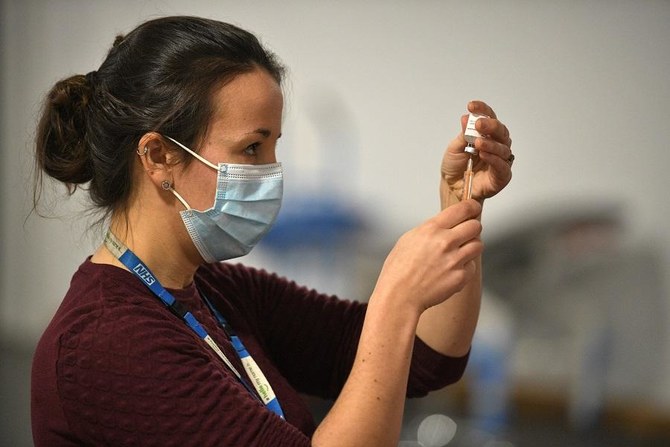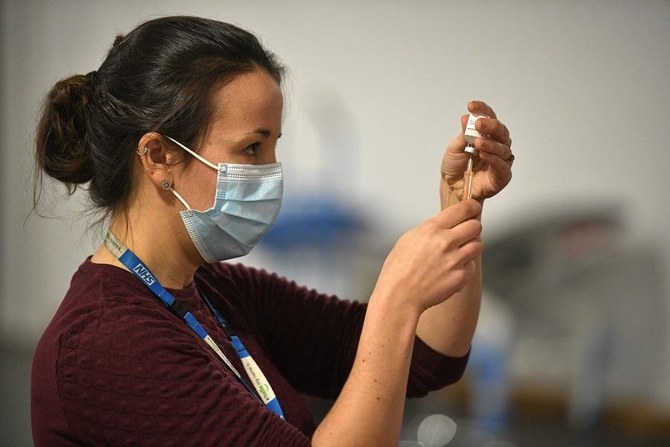BRUSELLS: The European Union will meet AstraZeneca executives on Monday to seek further clarification on why they unexpectedly announced a large cut in supplies of COVID-19 vaccine to the bloc for the first quarter of the year, EU officials said.
AstraZeneca, which developed its shot with Oxford University, told the EU on Friday that it could not meet the agreed supply targets running up to the end of March, with an EU official telling Reuters that meant a 60% cut to 31 million doses.
The Anglo-Swedish drugmaker has received an up-front payment of 336 million euros ($409 million) from the EU, a second EU official told Reuters when the 27-nation bloc sealed a supply deal with AstraZeneca in August for at least 300 million doses — the first signed by the EU to secure COVID-19 shots.
Under advance purchase deals sealed during the pandemic, the EU makes down payments to companies to secure doses, with the money expected to be mostly used to expand production capacity. “Initial volumes will be lower than originally anticipated due to reduced yields at a manufacturing site within our European supply chain,” AstraZeneca said on Friday. The site in question is a vaccine factory in Belgium run by the drugmaker’s partner Novasep.
The EU Commission said a meeting was called with AstraZeneca after Friday’s announcement, and is due to start in the early afternoon on Monday. AstraZeneca was not immediately available to comment on Monday.
The first EU official, who has been directly involved in talks with AstraZeneca, said there were no high expectations about the meeting in which the company will be asked to better explain the delays, although its outcome is still unclear. The official declined to be named due to the confidential nature of the discussions.
Earlier in January, Pfizer, which is currently the largest supplier of COVID-19 vaccines to the EU, announced delays of nearly a month to its shipments, but hours later revised this to say the delays would last only a week.
EU contracts with vaccine makers are confidential, but the EU official did not rule out possible penalties for AstraZeneca, given the large revision to its earlier commitments. However the source did not elaborate on what could trigger the penalties. “We are not there yet,” the official added.
AstraZeneca’s vaccine is expected to be approved for use in the EU on Jan. 29, with first deliveries expected from Feb. 15.
EU seeks answers from AstraZeneca on cut to vaccine supplies in Monday meeting
https://arab.news/9489f
EU seeks answers from AstraZeneca on cut to vaccine supplies in Monday meeting

- The Anglo-Swedish drugmaker has received an up-front payment of 336 million euros ($409 million) from the EU
Ukraine’s Zelensky: Ceasefire with Russia possible at any moment

Zelensky, speaking at a joint news conference in Prague alongside Czech President Petr Pavel, also said that Ukraine hopes to receive 1.8 million shells in 2025 under a Czech initiative to provide military assistance.
Indonesian president inaugurates Hajj and Umrah airport terminal in Jakarta

- Indonesian Hajj pilgrims have started departing for Saudi Arabia since Friday
- Kingdom’s Makkah Route initiative will be implemented at new Hajj and Umrah terminal
JAKARTA: Indonesian President Prabowo Subianto inaugurated on Sunday a special terminal for Hajj and Umrah pilgrims at Jakarta’s international airport, where travel will also be facilitated under Saudi Arabia’s Makkah Route initiative.
Indonesia, which has the world’s largest Muslim-majority population, sends the highest number of Hajj and Umrah pilgrims every year.
As pilgrims around the world have already begun to make their way to Saudi Arabia for Hajj this year, about 221,000 people will be coming from Indonesia.
“The government wants to give the best service for our pilgrims. We also understand that many of our pilgrims are seniors, and so we must take very good care of them,” Subianto said during the inauguration ceremony at Soekarno-Hatta International Airport.
“We understand that our pilgrims have saved up for a long time, and even waited for a long time, and so the government under my leadership will do our very best to give the best services and work hard to lower the cost of Hajj.”
The airport’s 2F terminal area, which has undergone renovations, has been transformed into a dedicated area for Indonesia’s Hajj and Umrah pilgrims. It was developed to serve 6.1 million travelers annually, according to a statement issued by the Cabinet Secretariat.
The launch event was attended by Saudi Ambassador to Indonesia Faisal Abdullah Amodi, as well as other Indonesian ministers, including Religious Affairs Minister Nasaruddin Umar and State-Owned Enterprises Minister Erick Thohir.
Special counters for Saudi immigration, which are part of the Kingdom’s Makkah Route initiative, have also been set up at the new terminal.
The program launched in Muslim-majority countries in 2019 allows Hajj pilgrims to fulfill all visa, customs and health requirements in one place, at the airport of origin, and save long hours of waiting before and upon reaching the Kingdom.
In Indonesia, pilgrims departing from the cities of Jakarta, Surabaya and Solo are benefiting from the Makkah Route initiative.
“As President Prabowo said, this is proof of the government’s commitment to give the best service, especially for our senior pilgrims. He is also proud of the modern and comfortable facilities that have been set up,” Umar, the religious affairs minister, said on social media.
Thousands of Indonesian pilgrims have begun to depart for Saudi Arabia, after the first Hajj flights commenced last Friday.
Though the pilgrimage itself can be performed over five or six days, many pilgrims arrive early to make the most of the once-in-a-lifetime opportunity to fulfill their religious duty.
In 2025, the Hajj is expected to take place on June 4 and end on June 9.
Five policemen kidnapped in southwestern Pakistan

QUETTA: A separatist militant group in southwestern Pakistan on Sunday claimed an attack on a prison van in which five police officers were taken hostage.
Between 30 and 40 gunmen blocked a major highway that cuts across Balochistan province overnight on Friday, intercepting a prison van being transported by a police team, a police official said.
“The prisoners were released later but five policemen have been kidnapped,” a senior police official in the area, who was not authorized to speak to the media, told AFP on Sunday.
He said a rescue operation was underway.
The gunmen also set fire to government buildings and a bank in the area.
A senior government official, who asked not to be named, said that two gunmen were killed by security forces.
Pakistan has been battling a separatist insurgency in Balochistan for decades, where militants target state forces, foreign nationals, and non-locals in the mineral-rich southwestern province bordering Afghanistan and Iran.
The Baloch Liberation Army (BLA), the most active group in the region, claimed the assault in Kalat district.
The BLA has previously targeted energy projects receiving foreign financing — most notably from China.
In March, the group seized a train, taking hundreds of passengers hostage and killing off-duty security forces in a three-day seige.
Two dead, 31 injured in Croatia bus crash

- he health ministry, cited by state news agency Hina, said several badly hurt people had undergone operations in hospital
ZAGREB: Two people died and 31 people were injured when a Bosnian-registered coach and a car crashed into each other in Croatia on Sunday, police and medical staff said.
The accident occurred at 3:00 am (0100 GMT) on a busy freeway some 50 kilometers (30 miles) east of the capital, Zagreb.
The casualties were taken to nearby hospitals, police spokeswoman Maja Filipovic told AFP, adding that an investigation had been launched to determine the causes.
The health ministry, cited by state news agency Hina, said several badly hurt people had undergone operations in hospital.
Photos published by local media showed a double-decker bus lying on its side in the middle of the freeway with its windows broken.
15 killed in head-on road crash in South Africa

- South Africa has a sophisticated and busy road network
- Road accidents claimed more than 11,800 lives in 2023
JOHANNESBURG: A night-time collision between a packed minibus taxi and a pick-up truck has killed 15 people in rural South Africa, a transport official said on Sunday.
Five people were in hospital with serious injuries after the crash at around midnight on Saturday to Sunday near the Eastern Cape town of Maqoma, about 1,000 kilometers (620 miles) south of Johannesburg, provincial transport spokesman Unathi Binqose official told broadcaster Newzroom Afrika.
The drivers of both vehicles were among the dead and an inquest would be opened to determine what happened, Binqose said.
The victims included 13 passengers in the minibus, which was reportedly traveling from the town of Qonce to Cape Town, a journey of nearly 1,000 kilometers.
South Africa has a sophisticated and busy road network. It also has a high rate of road deaths, blamed mostly on speeding, reckless driving and unroadworthy vehicles.
Road accidents claimed more than 11,800 lives in 2023, with pedestrians making up around 45 percent of the victims, according to the latest data from the Road Traffic Management Corporation.




















